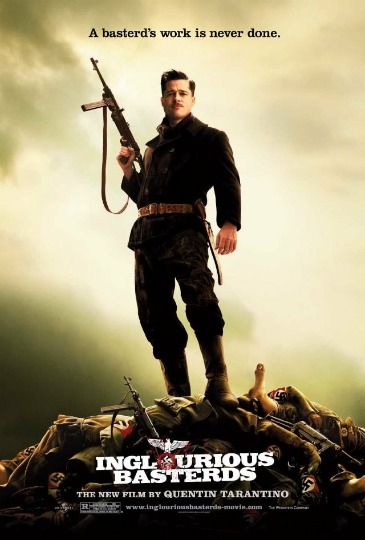We Present Four Ways For You To Enjoy Inglourious Basterds
By Steven Pate in Arts & Entertainment on May 29, 2012 8:40PM
 Has it already been three years since Quentin Tarantino dropped the confounding, exasperating, thrilling, annoying, beautiful Inglourious Basterds on the beach at Cannes? If, back then, you had asked us to bet on the likelihood that this revisionist World War II revenge fantasy would end up with a 88% fresh rating on rotten tomatoes, we would have taken the under. Any movie that has reviewers routinely addressing its morality has done something daring, and probably worth a second look.
Has it already been three years since Quentin Tarantino dropped the confounding, exasperating, thrilling, annoying, beautiful Inglourious Basterds on the beach at Cannes? If, back then, you had asked us to bet on the likelihood that this revisionist World War II revenge fantasy would end up with a 88% fresh rating on rotten tomatoes, we would have taken the under. Any movie that has reviewers routinely addressing its morality has done something daring, and probably worth a second look.
This Friday, Doc Films caps its Quentin Tarantino retrospective "Burn Down The Cinema" with the first look at the $321 million hit since it left theaters. How do you enjoy the mature work of Hollywood's former enfant terrible if you missed it the first time around? Your answer in four parts:
1. Let Quentin be Quentin
Tarantino is an entity unto himself now, the only filmmaker creating art-house exploitation blockbusters. There will be ostentatious cleverness, orgiastic violence and doses of self-awareness that would kill any mortal director. Just don't walk into the theater expecting an action movie, a war movie, a faithful period piece, or an investigation of Nazi culpability. The two strands of the plot concern a Dirty Dozen-style band of sociopathic American Jews who literally scalp Nazis, and a secretly-Jewish Paris movie house manager who turns a German publicity stunt decidedly against the Reich. Never has the subject of wartime atrocities been such confident panache. You're not going to learn anything, but if you allow yourself to be entertained, Tarantino has a lot of ammo.
2. The Call is Coming from Inside the Video Store. Answer it.
The greatest thing about Tarantino doing a period piece is that it forced him into a context where he couldn't have characters drop the pop cultural references themselves. He is at his strongest when he must show rather than tell, and there is no shortage outlets for the cleverness he finds so irresistible. You get the impression that he's just as giddy about writing Emil Jannings into his script as he was riffing on the Royale with cheese. Hunting down every wink and nod to every cool thing he wants to congratulate you for noticing, especially echoes of old movies and actors, is a type of enjoyment all to itself.
3. Cake Ownership, Meet Cake Possession
As a revenge fantasy, Basterds is audaciously constructed. By the vigorous finale, all manner of repugnant behavior (machine gunning an trapped and unarmed crowd, burning humans alive, ritual maiming, etc.) becomes what we are meant to root for. If our cheers stick in our throats, maybe it is because we remember how glibly we nodded along, two hours earlier, as Brad Pitt's sadistic Aldo Raine flatly observed "A Nazi ain't got no humanity." Nazis (like zombies) serve us as stock movie characters upon whom it is uncontroversial to wish cinematic violence. Which is how Tarantino responded to accusations of cruelty: “I was too brutal to the Nazis?” Tarantino is not the kind of director to stake out a moralist position and hang his audience out to dry for enjoying his film, but there is no dispelling the moral vertigo of enjoying the spectacle of violence done to people who are evil (in part because they seemed to enjoy the spectacle of violence done to people whom they thought evil). Even if we follow Hostel maestro Eli Roth, who stars in Basterds and called himself the director's "Jewish sounding board" and call the film "kosher porn." If you gaze into the abyss, the abyss gazes also into you.
4. "Wait for the creme"
Even if the film were crippled by moral compromise or ostentatious referentiality, there would be no denying the pleasure of of the Tarantino's filmmaking when he is at his best. Savor these moments. The spell-binding opening sequence. Michael Fassbender slipping back into an English accent when his cover is blown in a basement tavern, during a sequence of deliciously unrelenting tension. Mike Myers out of nowhere. Every second Chrstoph Walz is on camera. Mélanie Laurent's collapse into relief Walz leaves the table with her. Tarantino pushed himself into new territories with this film and it turns out to be the greatest pleasure of all to watch him juggle the many genres and moods he tossed up in the air.
Inglourious Basterds plays Friday, June 1 at Doc Films, Ida Noyes Hall, 1212 E 59th Street, at 7 p.m. and 10 p.m.